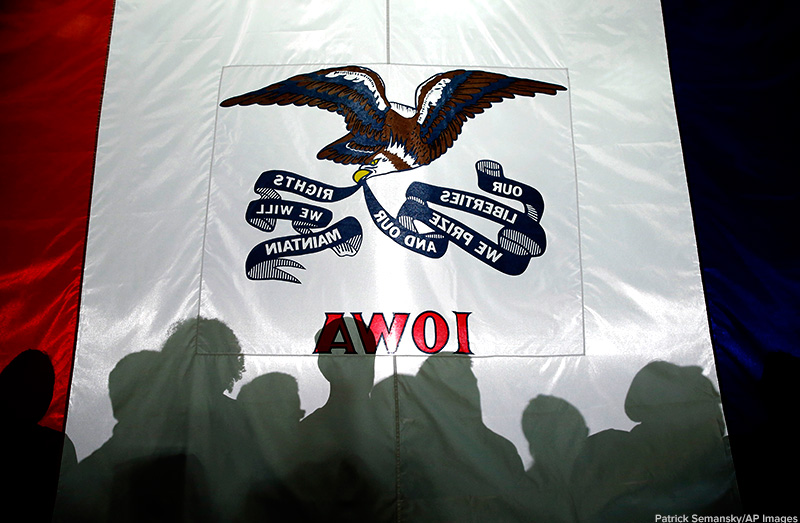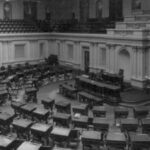- Current Events New Alabama Congressional District Selects Candidates
- Current Events Nebraska Rejects Winner-Take-All Proposal
- Citizenship Voting Under Age 18
- Citizenship Citizenship in Action
- Democratic Party Biden’s and Trump’s Recent Primary Results
- Elections Trump and Biden Win South Carolina and Michigan Primaries
Republican Presidential Candidates Focus on Iowa
The U.S. presidential nomination process is often described as a race. The Iowa caucuses have traditionally marked the starting line. This will be true again when Iowa’s Republican Party caucuses take place on January 15, 2024.
The process of nominating presidential candidates involves a series of state primaries and caucuses. In primaries, the candidate with the most votes is awarded a number of state delegates. To win a party nomination, a minimum number of delegates must be earned in state primary votes. A handful of states, however, use caucuses instead of primaries. A caucus is a meeting of members of a political party. People gather for caucuses in local meeting places to discuss candidates and select delegates to attend the party convention. The caucus process has been criticized for being complicated and time consuming for participants.
The primary and caucus schedule is less predictable compared to previous years. The date and details of the Democratic contest in Iowa remain undecided. The party was not happy with the results of the 2020 Democratic Iowa caucuses, which became chaotic when an app meant to improve the process malfunctioned. It delayed the results and caused much confusion. The Democrats have suggested a mail-in primary vote in place of the traditional caucus. New Hampshire, traditionally the second contest in the country, has not yet decided on the state’s primary dates.
A Closer Look at the Candidates
Because Iowa is the first contest in the election campaign, candidates campaign there more than one might expect for a state with only six Electoral College votes. Some candidates held events in Iowa last winter to increase their name recognition among Iowa voters. Many states, Iowa included, may be greeted with a blizzard of campaign TV commercials in an election year. But candidates in Iowa have routinely reached out to voters in more personal ways as well, turning up at town halls, fairs, diners, ice cream stores, and the annual Lincoln Dinner hosted by the state Republican Party.
Some of the Republican candidates campaigning in Iowa include former president Donald Trump; Florida governor Ron DeSantis; former vice president Mike Pence; South Carolina senator Tim Scott; former South Carolina governor and UN Ambassador Nikki Haley; former Arkansas governor Asa Hutchinson; and businessperson Vivek Ramaswamy. One candidate Iowans may not see is former New Jersey governor Chris Christie, who is prioritizing the New Hampshire primary over the Iowa caucuses.
Seeking the Governor’s Endorsement
When Iowans from all over the state attended the Iowa State Fair in Des Moines earlier this month, fairgoers were not surprised to see candidates eating the latest deep-fried midway treat. While the candidates may enjoy the food and games at the fair, they also seek the endorsement of Kim Reynolds, Iowa’s popular Republican governor. Governor Reynolds has remained neutral but said the time may come when she will endorse a candidate. She hosted a series of appearances at the state fair with most of the major Republican candidates.
One notable exception to Governor Reynolds’ joint appearances is former president Donald Trump. While Trump campaigned at the state fair, he did not appear with Governor Reynolds. Trump has made public statements criticizing Reynolds for not endorsing him. He has also commented that he does not invite her to his events. Presently Trump holds a large lead in the polls over his Republican rivals.
Looking Beyond the Primaries and Caucuses
For each party, the nominating process concludes with the party convention. The delegates for each party come together at the conventions and pledge support for the various candidates. The winning candidates will represent their respective party in the presidential general election to select the president. Candidates representing other political parties, known as third-party candidates, may also be on the ballots in various states. The 2024 Republican National Convention is scheduled for July in Milwaukee, Wisconsin. The 2024 Democratic National Convention is scheduled for August in Chicago, Illinois. The presidential general election is scheduled for November 5, 2024.



